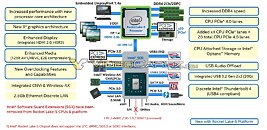Friday, July 10th 2020

Intel Core i7 "Rocket Lake" Chips to be 8-core/12-thread?
It's been rumored for some time now, that the 14 nm "Rocket Lake-S" silicon has no more than 8 CPU cores, giving Intel's product managers some segmentation headaches between the Core i7 and Core i9 brand extensions. The current 10th Gen Core i9 chips are 10-core/20-thread, and Core i7 8-core/16-thread. The 10th Gen Core i5 chips are 6-core/12-thread, and this won't change with the 11th Gen "Rocket Lake." What will change, however, are the core-counts of the Core i7 and Core i9 processors, according to a leaked roadmap slide scored by VideoCardz.
With no more than 8 "Cypress Cove" cores on the "Rocket Lake-S" silicon, the 11th Gen Core i9 will be 8-core/16-thread. The 11th Gen Core i7, however, will be 8-core/12-thread. We don't know how this would work out, but Intel dropped hints toward it with the current 10th Gen Core "Comet Lake," whereby end-users have the ability to toggle HyperThreading (HTT) on a per-core basis. Older generations of Intel processors only allowed a global toggle of HTT. This would mean 4 out of 8 cores on the Core i7 "Rocket Lake-S" will have HTT permanently disabled. We predict that two of these will likely be the processor's favored cores, capable of sustaining the highest boost clocks under the Turbo Boost Max 3.0 algorithm, to which the OS thread scheduler will send the maximum traffic. The roadmap slide also suggests that Intel could standardize the vPro feature-set to its unlocked "K" processors with the 11th Gen.
Source:
VideoCardz
With no more than 8 "Cypress Cove" cores on the "Rocket Lake-S" silicon, the 11th Gen Core i9 will be 8-core/16-thread. The 11th Gen Core i7, however, will be 8-core/12-thread. We don't know how this would work out, but Intel dropped hints toward it with the current 10th Gen Core "Comet Lake," whereby end-users have the ability to toggle HyperThreading (HTT) on a per-core basis. Older generations of Intel processors only allowed a global toggle of HTT. This would mean 4 out of 8 cores on the Core i7 "Rocket Lake-S" will have HTT permanently disabled. We predict that two of these will likely be the processor's favored cores, capable of sustaining the highest boost clocks under the Turbo Boost Max 3.0 algorithm, to which the OS thread scheduler will send the maximum traffic. The roadmap slide also suggests that Intel could standardize the vPro feature-set to its unlocked "K" processors with the 11th Gen.


39 Comments on Intel Core i7 "Rocket Lake" Chips to be 8-core/12-thread?
Still 14nm, 8 core and 12 threads:confused:, going back to max 8 cores from 10 while amd has 16 cores:kookoo:.
If this continues like this. I am just about to lose fate in Intel. Don't be surprised if my next pc will be powered by Zen 3.
www.techradar.com/news/intel-doesnt-want-its-cpus-to-be-judged-just-on-benchmarks-but-also-broader-benefitswww.tweaktown.com/news/72914/intel-dont-worry-about-cpu-benchmarks-because-of-coronavirus/index.html
:respect:
E.g. for gaming, all the cores in the world will not help you if you don't have cores which are fast enough, and many slow cores will certainly stutter more than fewer faster cores.Yeah, with a few exceptions, faster cores is always preferred. Faster cores will give you more performance in nearly all applications, and a more responsive machine. More cores will help certain applications.
I meant all the running apps, processes, threads and handles to be distributed evenly between the cores, without competing for resources:
Alder Lake having Big-Little garbage in a Desktop and this is having some wierd abominated design like HT disabled it's outright garbage.
O oh, so now Intel is innovating by bringing back the quad just now with a mobile soc glued on top for free
Great.
Because 8 cores with a 30% better IPC will never equal or better a 16 core. No brainer really.
Rocket Lake is not a specific target, so I assume it will share the ISA level with either icelake-client or tigerlake.Yes, it's highly workload dependent. Near perfect scalability on 16 cores and beyond is mostly limited to larger "batch jobs", like encoding, Blender rendering etc. The worst scalability is achieved in heavily synchronized and latency sensitive applications like games, and we will not see good scalability here because of the overhead of synchronizing too many threads. And then we have applications which are somewhere in the middle, like Photoshop and Premiere, which benefits from more cores up to a point, but benefits even more from faster cores. So the right choice comes down to what the computer will be used for, but far more real world applications will benefit from faster cores than more cores.